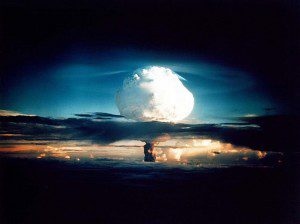
(image via Pixabay)
Today is the anniversary of the atomic bombing of Nagasaki; we remembered the Hiroshima bombing days ago. If you’re like me, you’ve been in plenty of arguments in the past few days, over what our true motivation was for using nuclear weapons was and whether it was justified. Other bloggers have spoken more eloquently than I could about that topic. I do not have very much to add. I could type until my fingers fall off that the Church forbids acts of warfare that deliberately target civilians, which the atom bombs did. Ground Zero for the Hiroshima bomb was a hospital in a civilian city, not a military base. I could re-type a hundred times that two wrongs don’t make a right, and the fact that the Japanese committed unspeakable atrocities cannot justify our breaking the laws of just war– even if they would have murdered us all otherwise.
But I don’t think that would add to the discussion.
When I was taking bioethics courses, the seeming callousness of the philosophers we studied frightened me. It seemed so strange to reduce ethics to syllogisms and thought experiments– to base all of your actions on a logic puzzle, on a game where we imagine a speeding trolley or a robot with a brain made of Christmas lights; to decide how to treat someone based upon a stodgily worded rule in a textbook without pictures or conversations. I don’t think that’s what the professor or the philosophers we studied meant to get across. I was a bit surprised, when I met one of those stodgy philosophers in person, to find that he was a human being capable of emotion and not himself a robot. But that’s how it felt. As if being an ethical person, was being a person who always had the right data and the right way of reasoning. As if being a bad person was merely a matter of not having studied or thought hard enough.
We are fallen beings. In order to love our neighbor rightly, we need some rules; we need the commandments, we need the Catechism, we need Just War Theory and other declarations. These are true and real things we ought to know. But those things are not what love of neighbor is. Those things are to direct us, in the quest to love our neighbor as we ought. Love of neighbor is prior. Love of neighbor comes when, through the mercy of God, the veil is drawn aside and you see that your neighbor is Christ. Love of neighbor is the quest to honor Christ when we find Him. Rules can show us how, but they can’t make us love. Love is to see the Deity in the Tabernacle, and to want to worship; ethics keep us from loving wrongly. Recognition has to come first.
Evil is not the result of a logical mistake. Evil doesn’t come from not having taken a bioethics course. Evil is refusing to see the Deity. Evil is refusing to worship when you do.
Leave everything aside for the moment. Forget, for just a second, what anyone did to anybody else prior to the moment that the bomb was dropped on Nagasaki. No sin can take away a human’s dignity. However we mar the tabernacle, we remain tabernacles with Christ enthroned or imprisoned within.
Pray with me. Lord, that we might see!
Now, watch this. These people were a child and a teenager at the time we dropped the bomb. They didn’t start the war. They couldn’t control how they participated. Look at them as human beings. Just listen to them for a few minutes. Gaze upon the icon of Christ, and listen. Don’t let me tell you what to believe. Look at the Body of Christ. Listen.
Lord, that we might see.













